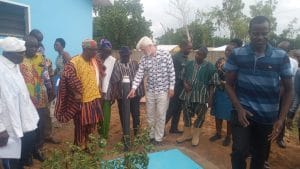In a groundbreaking effort to safeguard the Vea Dam, a vital water source for Bolgatanga and surrounding communities, students of Gowrie Senior High Technical School (GSHTS) have commissioned a locally-built greywater treatment plant designed to stop years of untreated wastewater from polluting the dam.
The project, which took two and a half years to complete, is a student-led environmental innovation that highlights the potential of technical and vocational education in solving real-world problems. The dam, located within the Kpasenkpe sub-basin, has long faced threats from improper wastewater disposal—particularly from the school itself.
Using locally available materials such as plastic bottles, sand, and minimal cement, the students developed a four-chamber system that includes sedimentation, primary filtration, advanced treatment, and clean water collection for reuse.
According to Mr. Roland Awine Adabre, a teacher in the school’s technical department, the project is a practical application of classroom knowledge.
“This achievement proves that our students are not only thinking critically but are also taking action to address real-world environmental issues,” he said.
The project was made possible through financial and technical support from Blue Deal Ghana, operating under the Water Resources Commission (WRC), in collaboration with the Dutch Water Authorities.
Dr. Justice Aduko, Project Manager of Blue Deal Ghana, noted that the school was identified as a major contributor of greywater pollution to the dam. In response, an innovation contest was launched to challenge students to design a sustainable treatment system. The winning solution—now implemented—has become a model for Integrated Water Resources Management (IWRM).
“We can have a national competition just like debates and science quizzes, but focused on technical problem-solving,” Dr. Aduko proposed, calling for the integration of the project into the national school curriculum.
He also indicated that the system will double as a demonstration site for the school’s agriculture department to train students in water reuse technologies, boosting practical learning and eco-conscious farming practices.
The commissioning event drew key stakeholders, including the Paramount Chief of Bongo, Bonaba Salifu, who encouraged students to take their studies seriously and called on authorities to improve water infrastructure in the region.
ICOUR Managing Director, Dominic Anarigide, praised the initiative and pledged support to replicate the model in other schools, especially those focused on agricultural water access and management.
This student-driven greywater treatment project marks a significant milestone in environmental sustainability, education-driven innovation, and community involvement, offering a replicable model for other technical schools across Ghana and beyond.
Source: A1Radioonline.com | 101.1MHz | Moses Apiah | Bolgatanga



